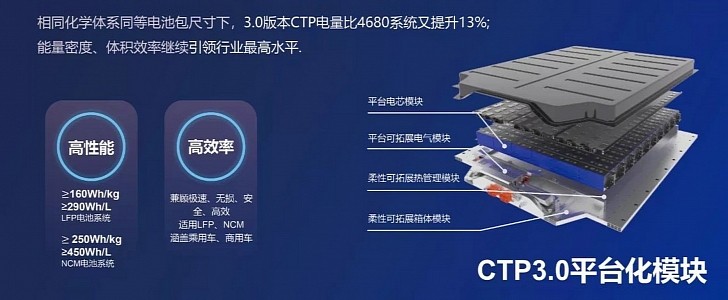CATL is the biggest producer of Li-Ion batteries in the world and one of the major suppliers for Tesla. The Chinese battery producer will soon start producing its signature Kirin batteries, offering improved performance, even compared to the 4680 cells used by Tesla. Nevertheless, Tesla is not expected to switch to CATL’s technology.
CATL announced their third generation cell-to-pack (CTP) technology a while back, touting “13% higher energy density than a large cylindrical battery with the same electrochemical system.” The reference is clearly targeting Tesla, which recently started manufacturing the 4680 cells. It is not the first time CATL teases Tesla, although it is one of the main suppliers for the leading EV maker.
It’s pretty much obvious at this stage that Tesla won’t abandon the 4680 cells for the CATL’s Kirin CTP technology. This is acknowledged by Robin Zeng, founder and chairman of the power battery giant, even as he confirmed CATL will officially unveil the Kirin battery next quarter. This is the formal step before entering volume production.
“At the same time, some customers need to use large cylindrical batteries for special vehicle design reasons, and we have already started cooperation,” said Zeng, hinting at the partnership with Tesla.
CATL is a promoter of LFP batteries, which are said to offer lower energy density than other chemistries. Nevertheless, the Kirin battery is not limited to using this chemistry exclusively. That’s exactly why CATL’s chairman references a large cylindrical battery “with the same electrochemical system.”
The Kirin CTP could provide 160 Wh/kg or 290Wh/l when using LFP cells. But when switching to the NMC chemistry, that number reaches 250 Wh/kg or 450 Wh/l. This is the energy density of the battery pack, not of the individual cells. Currently, Tesla’s 2170 battery cells offer around 260 Wh/kg, but this is at the cell level, not the full pack.
It’s pretty much obvious at this stage that Tesla won’t abandon the 4680 cells for the CATL’s Kirin CTP technology. This is acknowledged by Robin Zeng, founder and chairman of the power battery giant, even as he confirmed CATL will officially unveil the Kirin battery next quarter. This is the formal step before entering volume production.
“At the same time, some customers need to use large cylindrical batteries for special vehicle design reasons, and we have already started cooperation,” said Zeng, hinting at the partnership with Tesla.
CATL is a promoter of LFP batteries, which are said to offer lower energy density than other chemistries. Nevertheless, the Kirin battery is not limited to using this chemistry exclusively. That’s exactly why CATL’s chairman references a large cylindrical battery “with the same electrochemical system.”
The Kirin CTP could provide 160 Wh/kg or 290Wh/l when using LFP cells. But when switching to the NMC chemistry, that number reaches 250 Wh/kg or 450 Wh/l. This is the energy density of the battery pack, not of the individual cells. Currently, Tesla’s 2170 battery cells offer around 260 Wh/kg, but this is at the cell level, not the full pack.






